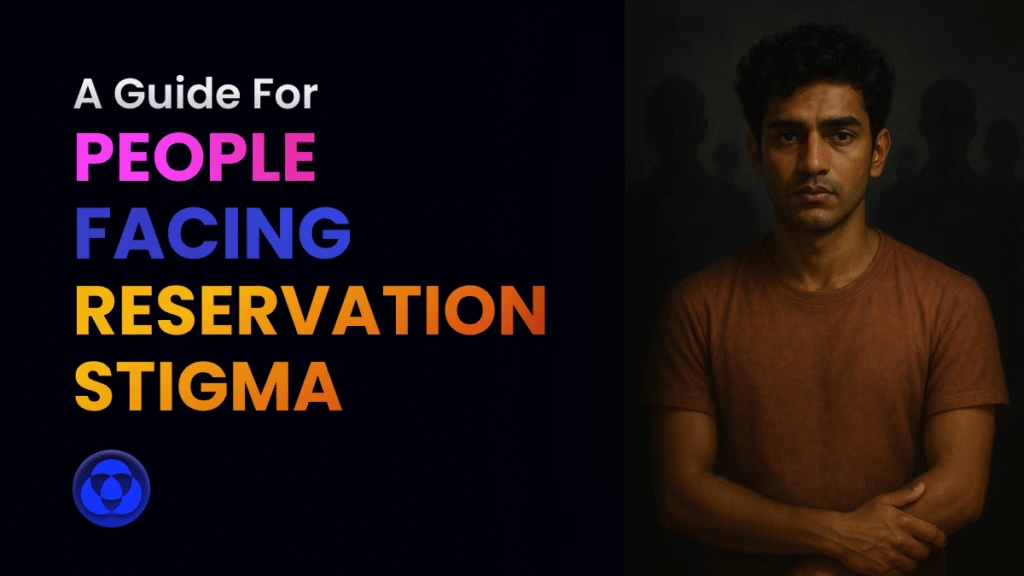Why do we keep putting things off, even when we know it’s important? You may have told yourself, “I’ll do it later,” thinking it’s just laziness or a lack of discipline. But for many Bahujan students, procrastination is not a sign of weakness. It is a survival response.
You are not lazy. You’re carrying invisible burdens: caste-based pressure, financial insecurity, household responsibilities, and a system that was never designed for your success. These aren’t excuses. They are real forces that impact your focus and energy every single day.
When expectations feel impossibly high and failure feels dangerous, your brain might shut down to protect you. That’s emotional overwhelm. It’s not that you don’t want to try. It’s that trying feels too heavy. Sometimes, your body goes into freeze mode. This doesn’t mean you don’t care. It means you care so much that the fear of failing keeps you stuck.
Understanding this is the first step. Once you realize procrastination is often a response to trauma, not a character flaw, you can begin to unlearn the shame and build strategies that honor your reality. You’re not alone in this. And you don’t have to fight through it in silence.
Understanding Procrastination in the Context of Caste and Marginalization
Procrastination is the act of delaying or avoiding tasks, even when we know they’re important. While it’s often dismissed as laziness, for many Bahujan students, procrastination is deeply connected to social, emotional, and generational challenges. It’s not just about managing time. It’s about surviving within systems that were never built for us.
What Procrastination Looks Like: Beyond Just “Delaying Work”
For marginalized students, procrastination may appear as difficulty starting assignments, zoning out while studying, or putting off decisions. This isn’t due to disinterest, but often stems from internalized stress, fear, or burnout. It can feel like something inside is holding you back, even when you genuinely want to move forward.
The Role of Caste-Based Trauma, Lack of Representation, and Self-Doubt
When you rarely see yourself represented in positions of power or academic success, it slowly erodes your confidence. Caste-based trauma, whether through subtle exclusion or direct discrimination, leaves lasting emotional scars. Over time, this can lead to self-doubt questions like “Am I even good enough?” That doubt leads to delay, and delay can turn into shame.
How Generational Struggles Affect Motivation and Consistency
Many Bahujan learners carry the dreams and expectations of their families and communities. Being a first-generation student means navigating the education system without a clear roadmap, often while managing financial stress and emotional pressure. Inconsistency is not about lacking willpower. It often results from carrying too many responsibilities too early, with too little support.
The Hidden Struggles Bahujan Students Face
Procrastination for Bahujan students isn’t just about distractions or poor planning. It is shaped by environments full of noise, pressure, caste discrimination, and limited resources. When the system itself isn’t designed for you, staying consistent becomes a struggle. Naming these challenges is the first step to building solutions that actually work for us.
When Your Environment Doesn’t Support Studying
Many Bahujan students don’t have a peaceful corner, a study desk, or access to academic tools. Instead, they study in crowded rooms, surrounded by chores, responsibilities, and noise. It’s hard to focus when survival takes up most of your energy.
Household Responsibilities and No Quiet Spaces
You may have to cook, clean, or take care of siblings before you can even sit down with a book. There’s often no private space or time for uninterrupted study. This leads to exhaustion, which shows up as procrastination. Not because you’re lazy, but because your energy is already spent.
Lack of Role Models and Academic Support
Without mentors or examples to look up to, it’s easy to feel lost. No one tells you how to plan a career, fill forms, or deal with failure. This absence of guidance makes even small tasks feel intimidating, and procrastination becomes a way to avoid making mistakes.
Carrying the Weight of Expectations
You’re not just studying for yourself. You’re carrying your family’s hopes and the dreams of those who were denied education. That pressure can feel heavy, and when things go wrong, it hits harder.
Guilt, Shame, and Fear of Letting the Family Down
Missing a deadline or needing rest might trigger guilt. Thoughts like “Am I wasting this opportunity?” are common. Many Bahujan students fear disappointing their families, and that emotional weight often leads to freezing up or delaying tasks.
Impostor Syndrome and Self-Doubt in Higher Education
Even after reaching college or a good job, many still feel like outsiders. Thoughts like “Do I belong here?” or “Was it just reservation?” can lead to deep self-doubt. This insecurity turns into procrastination. Not out of carelessness, but out of fear of being exposed.
Practical Strategies to Overcome Procrastination as a Bahujan Student
Procrastination isn’t just laziness. For Bahujan students, it often stems from exhaustion, emotional stress, or years of navigating caste-based barriers in education. Overcoming it involves understanding its root causes and applying strategies to manage your time, motivation, and mindset.
These strategies are grounded in care, community, and realism tools to support your growth, not punish your pace.
1. Understand Why You Procrastinate
The first step in overcoming procrastination is recognizing what’s behind it. Common causes include:
- Fear of failure
- Perfectionism
- Feeling overwhelmed
- Lack of motivation or interest
- Poor time management
Ask yourself: What am I avoiding, and why? Once you identify the root, you can begin to respond with intention rather than self-judgment.
2. Shift Your Mindset
The way you think about tasks can influence how likely you are to begin them.
- Reframe your language: Say “I choose to” instead of “I have to.”
- Let go of perfection: Progress matters more than perfection.
- See studying as empowerment: Each step is a reclaiming of space that was historically denied.
3. Break Tasks Into Manageable Actions
Starting can be the hardest part, especially when a task feels too big or vague.
- Break large tasks into 10–15 minute steps.
Instead of “write essay,” try “outline main points” or “write intro paragraph.” - Use the 2-minute or 5-minute rule.
Tell yourself, “I’ll just do this for 2 minutes.” Often, momentum follows. - Apply the Pomodoro Technique.
Study in focused 25-minute blocks with 5-minute breaks. - Set deadlines even self-imposed ones.
Structure creates clarity and motivation.
4. Create a Flexible Study Environment
Your space might not be ideal, and that’s okay. You can still find ways to work effectively.
- Use quiet windows in your day, such as early mornings or late nights.
- Use earphones with ambient sounds or instrumental music.
- Focus on controlling your rhythm if you can’t control your space.
5. Build Small, Sustainable Habits
Change doesn’t have to be big to be powerful.
- Try Habit Stacking: Tie a study task to an existing habit.
Example: “After breakfast, I will revise one page of notes.” - Make your ritual sacred: Light a diya, sip tea, or listen to calming music before studying.
These small cues can anchor your focus and make study time feel intentional.
6. Minimize Distractions
Creating boundaries around your attention is key.
- Turn off app notifications.
- Use website blockers like Cold Turkey or StayFocusd.
- Keep your study area clean and organized.
- Limit multitasking and give one task your full focus.
7. Add Accountability and Community Support
You do not have to walk this path alone.
- Pair with a peer for daily check-ins.
- Join or create small WhatsApp or Telegram goal groups (3–5 people).
- Work alongside others virtually (body doubling) or in real life.
- Use accountability apps if they help keep you on track.
8. Practice Emotional Check-Ins
Academic pressure often masks emotional fatigue. Acknowledge your inner state.
- Before you start studying, ask:
“How do I feel?”
“What am I avoiding?”
“What would make this easier?” - Journal your thoughts honestly. You don’t need perfect grammar, just reflection.
9. Practice Daily Affirmations
Affirmations remind you of your power and purpose.
- “I am learning at my own pace.”
- “Studying is my form of resistance.”
- “I come from strength.”
Speak them aloud or write them down. Root your learning in dignity, not performance.
10. Use Culturally Rooted and Safe Learning Spaces
You deserve to study in environments that affirm who you are.
- Follow Bahujan scholars, artists, and educators for inspiration.
- Join Bahujan-led platforms, Telegram study circles, or Bahujan-run YouTube channels.
- Representation matters. Seeing others who share your background succeed reinforces that you can too.
11. Take Care of Your Body and Mind
Procrastination increases when your body is depleted.
- Prioritize sleep, movement, and nourishment.
- Reduce stress where possible through breathing exercises, breaks, or talking to someone you trust.
- Make time for joy. Rest is part of the work.
12. Celebrate Small Wins
Every step matters.
- Acknowledge your progress daily.
- Reward yourself, even for small accomplishments.
Example: “If I study for 25 minutes, I’ll take a walk or listen to music I love.”
Small rewards build positive reinforcement and long-term momentum
Progress, Not Perfection: Your Pace Is Valid
Redefining What Success Looks Like
For Bahujans, success has long been defined by systems that weren’t made for us. The pressure to “catch up” comes from histories of exclusion, such as caste bias, limited resources, and generational poverty. Redefining success means recognizing that surviving in these conditions is already powerful. Thriving doesn’t have to mean elite degrees or flawless resumes. It can mean emotional stability, joy, and building community.
From Surviving to Thriving: Small Steps Matter
Progress in our lives isn’t always linear. Each class attended, form filled, or boundary set is a win. These steps may seem small by mainstream standards but carry deep meaning when taken in the context of systemic injustice.
You’re Not Behind, You’re Building Forward
You’re not late. You’re often the first. Many of us are laying a foundation where none existed before. Every effort you make supports those who follow. This isn’t delay. It’s a beginning.
Let Go of Toxic Productivity Standards
Productivity ideals shaped by savarna and capitalist norms glorify burnout and ignore Bahujan realities. Our energy is divided across survival, care work, and emotional labor. These standards were never built with us in mind.
Rest Is a Right, Not a Reward
Rest has been denied to us through both labor exploitation and social neglect. It’s not laziness to rest. It’s resistance. You don’t need to earn it. You already deserve it.
You Are More Than the Hustle
Your worth is not measured by how much you work. The need to prove ourselves through constant hustle is exhausting. You are enough, even in stillness. Rest, joy, and peace are not extras. They are your right.
Final Thoughts: Choosing Yourself Every Day
Overcoming procrastination isn’t just about better time management; it’s about reclaiming your right to dream, focus, and build a life beyond survival. For Bahujan students, every time you sit down to study, despite the noise, the doubts, and the weight of history, you are pushing back against a system that was never built for you. That in itself is powerful.
You are not lazy. You are not incapable. You are navigating daily resistance: caste bias, lack of resources, family expectations, mental exhaustion. And still, you are choosing to keep going. That’s not a small thing. That’s revolutionary.
Even on days when you fall behind or feel stuck, remember: your worth is not defined by productivity. Your efforts, no matter how small, are valid. Healing takes time. Focus takes practice. And your version of success is something you have every right to define on your own terms.
You are allowed to go slow. You are allowed to rest. But never forget: every step you take toward your education, your healing, your future is a step toward liberation. Keep showing up. Keep choosing yourself. The world may try to write you off, but your story is still being written. And it’s powerful.
“Every time you choose to try again, you are refusing to be erased. That is courage. That is resistance.”










